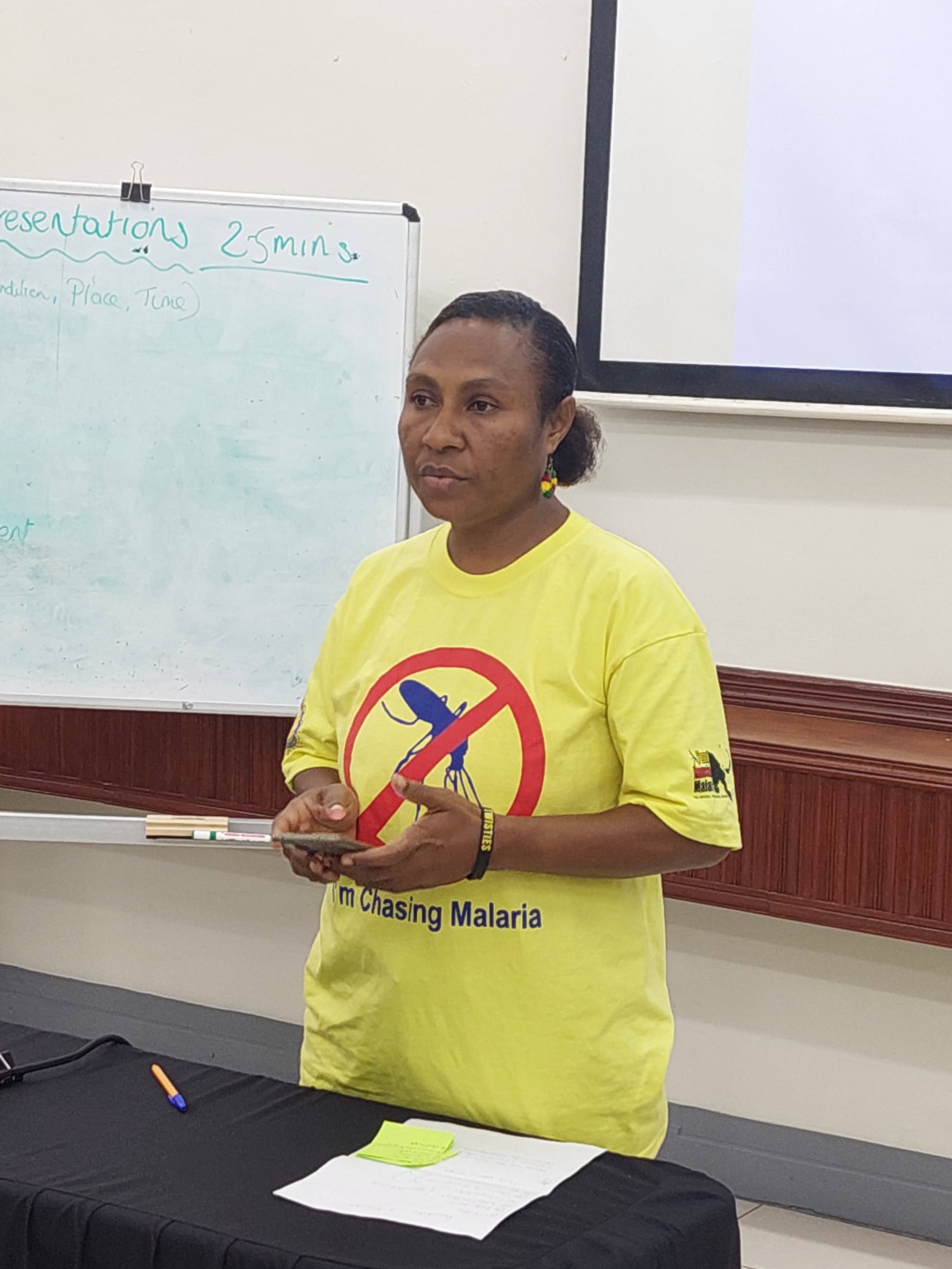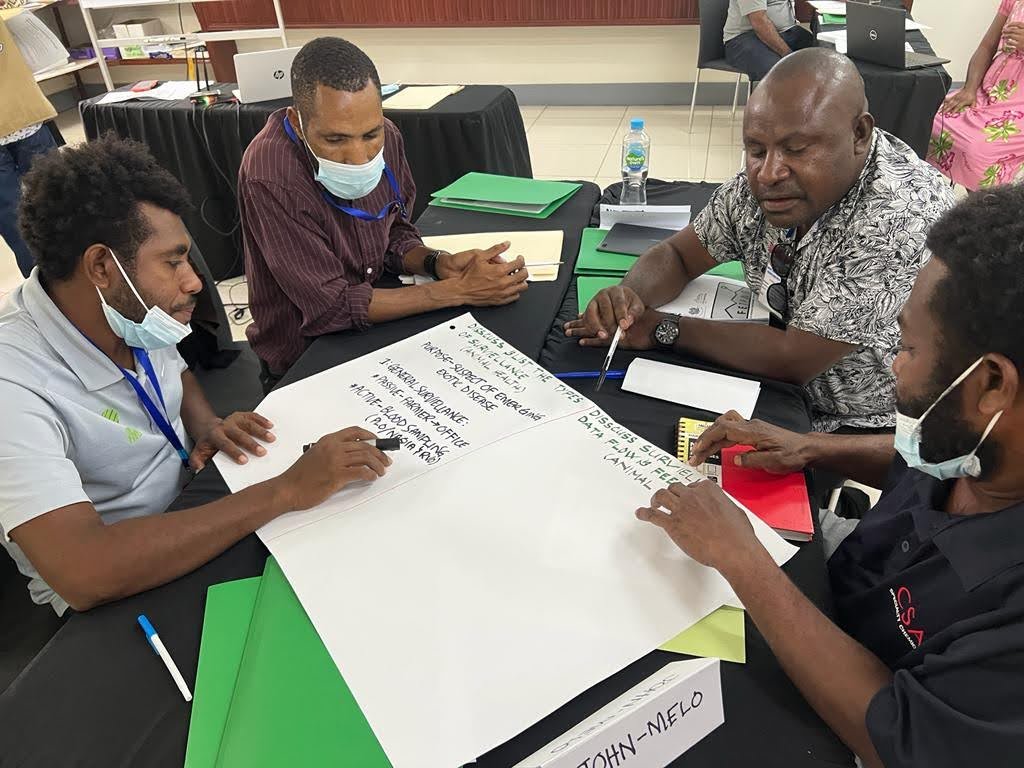The first One Health Frontline Field Epidemiology Training Program in Papua New Guinea: reflections from faculty and graduates
Written by Trinidad Velasco Ortuzar - PNG Frontline Program Faculty at Field Epi in Action
Background
Just 12-weeks after commencing their training, the first cohort of Papua New Guinea’s One Health Frontline Field Epidemiology Training Program (FETP) graduated in West New Britain Province (WNBP) in January. These 11 graduates represent PNG’s first field epi frontline professionals with expertise to collaborate across human, animal and environmental health sectors in surveillance and response.
Known as the Frontline FETP of PNG (f-FETPNG), the program was established to cascade health strengthening to the community level. Like other FETPs of PNG, f-FETPNG sees existing government workers upskilled by participating in three training workshops, with learning consolidated through completion of workplace-based field projects. But while PNG’s other FETPs focus primarily on public health workers, f-FETPNG enrols workers from human, animal and environmental health sectors to unite through a “One Health” approach. One Health integrates these traditionally separate sectors to build teams that utilise their respective expertise to create holistic, sustainable solutions to global health threats. WNBP was the first of PNG’s 22 Provinces to pilot f-FETPNG.
Graduates from the first Frontline Cohort in West New Britain, PNG
A One Health Approach
Reflecting on the gap f-FETPNG fills relative to other field epidemiology training initiatives in PNG, senior faculty Alois Pukienei says, "Although we provided the advanced and intermediate training, the missing link are the frontline health workers, who are the link to larger populations.” While the program may be new, the relevance of the program for PNG’s context is recognised by many. Bethseba Peni, also a senior faculty of FETPNG and WNBP’s Provincial Surveillance Officer, is excited to see the impact of the program in her province. "I value this training very much because officers were well equipped with basic knowledge on surveillance, outbreak response and communication methods. They will be of great help to me in responding to outbreaks in their own settings as well as networking with other stakeholders through the One Health approach, and together we will form up the Rapid Response Team."
While providing a brand new training pathway in PNG, f-FETPNG’s One Health approach and strong focus on community engagement are both practical and innovative offerings for the country’s field epidemiology suite of trainings. WNBP Environmental Health Officer and f-FETP graduate, Grace Bid says “Before, we realised the idea of a multi-sectoral approach was existing and in practice, but its relevance wasn’t clearly or fully understood. During the training, our perspectives of outbreak response were broadened with the One Health approach. My province has a high rate of malaria and TB [tuberculosis], which this One Health approach can effectively combat. Also, as West New Britain has a high level of volcanic activity and is a disaster-prone zone, effective One Health Approach response plans are very much needed." Fellow WNBP f-FETPNG graduate and Agriculture and Livestock Officer at Kandrian Inland, John Melo, agrees. “One Health is a sunshine approach for this province. Before, the three health sectors were working in isolation with minimal impacts. A One Health approach will help us to complement each other in terms of disease investigation and developing control measures to effectively minimise some of the common health issues in the province.”
One of PNG’s Frontline fellow, Maree Menik, Environmental Officer, sharing about her Malaria surveillance report.
Workshop discussions about the surveillance system data flow in the animal sector
Community Engagement Skills
Bethseba stresses the imperative of involving communities in health matters. “Most health-related events occur in the community level, so focusing and engaging the communities is very important for effective interventions.” Maree Menik, a WNBP f-FETPNG graduate who works in Occupational Health & Safety for the Provincial Health Authority, developed a broad range of community engagement skills in the process of conducting her f-FETPNG field project. "My community engagement was up, across and down by communicating through community leaders, through churches, teachers and students, and down to all community through awareness and open forum or meeting." John also recognises the benefits of meeting the local livestock owners during his training, which will strengthen relationships for the future. “I was privileged to utilise the network of farmers within Kandrian Inland local-level government to obtain data and conduct interviews. As an Agriculture and Livestock Officer, I was able to know in person most of the selected farmers interviewed.”
Putting One Health Strategies into Practice
After months of planning and then implementing the first One Health f-FETPNG, we are pleased to see Alois' vision taking shape and having an impact in the pilot province. Between f-FETPNG workshops, fellows were called to a small village where people were developing skin diseases following contact with water near a decaying whale carcass. Human, animal and environmental health representatives united through a One Health approach to evaluate the problem and take action.
f-FETPNG represents both a start for frontline workers and a continuation of the work that field epidemiologists do in PNG. With a newly graduated second cohort from West Sepik Province, and cohorts from Morobe Province and the National Capital District poised to commence their training in 2023, this new wave of field epis is set to not only strengthen public health systems, but animal and environmental health systems. Our graduates are already making history by putting One Health strategies into practice and transforming health in PNG.
f-FETPNG WNBP Graduate, Leonie Paraka, receiving her graduation certificate from Mr. Barry Ropa and Bethseba Peni
The graduation cake shared by the f-FETPNG WNBP cohort
Insights from Graduates
“Being a graduate of the Frontline FETP is a milestone. I am confident I can contribute effectively to improve surveillance and conduct appropriate field investigations within my locality. Conducting the field projects and presenting my results is the main highlight [of my training] and it helps me practically understand the concepts. Also, I strongly wish to enhance my knowledge on animal health in order to accurately diagnose suspected/emerging diseases, promoting effective biosecurity within the provincial level.”
f-FETPNG Graduate John Melo Graduate, Agriculture and Livestock Officer.
“After completing the One Health Frontline Training, I never regretted being one of the fellows graduating from this training. Previously I got involved a lot in Surveillance but without really knowing how to analyse data or doing field investigations. Also I can work well together with my other FETP One Health Frontline colleagues from other authorities as we can now speak the same language in One Health to address arising health issues in future.”
f-FETPNG Graduate, Maree Menik, Occupational Health & Safety.
“Overall, it was satisfying to complete the One Health Frontline training. I learned to appreciate the multi-sectoral approach more than I did before the training. I am now able to make changes to improve our surveillance systems and conduct an outbreak or field investigation more effectively with the steps I have learnt. There were many highlights of the training and for me community engagement and communication sessions topped the list.”
f-FETPNG Graduate, Grace Bid, Acting Provincial Malaria Supervisor.
About Field Epi in Action
We facilitate proven high impact intervention-based field epidemiology training, designed to develop work-ready graduates equipped with the necessary tools to support outbreak detection and response.








